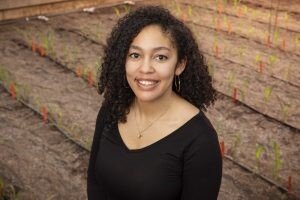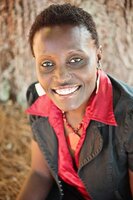Professor Esther Ngumbi, Assistant Professor of Entomology and African American Studies, has informed us of a recent publication milestone. She shared the early manuscript of a recently accepted manuscript that resulted from her collaboration with Dr. Angela Kent (of Natural Resources and Environmental Sciences), and her PhD student Sierra Raglin. The article is titled “Herbivory protection via volatile organic compounds is influenced by maize genotype, not Bacillus altitudinis-enriched bacterial communities.” It will appear in an issue of Frontiers in Microbiology https://www.frontiersin.org/articles/10.3389/fmicb.2022.826635/abstract
Professor Ngumbi describes Raglin as “a very prolific and smart African American scientist . . . .” We were excited when Dr. Ngumbi joined our faculty with a joint appointment in Entomology. She says “I will keep on fostering these type of collaborations that will allow us to train more black scientists. And, hopefully, we can find ways to co-organize a university-wide symposium series to ensure that all black students on our campus irrespective of their discipline have some ties with AFRO.”
Raglin is a Ph.D Student (Natural Resources and Environmental Sciences, Center of Advanced Bioenergy and Bioproducts Innovation) since 2017. She holds a B.S., Animal Sciences from Rutgers University at New Brunswick-Piscataway. This is how she describes her research interests: “I’m currently a Graduate Research Assistant within the Department of Natural Resources and Environmental Sciences. I’m particularly interested in Microbial Ecology, Applied Microbiology, and host-microbiome research. My graduate research focuses on plant-microbial interactions and how the root metabolome interacts with nitrogen cycling microorganisms. Broadly, the purpose is to understand how plant-microbial interactions impact the sustainability of agroecosystems.”
For a look at the kind of work Dr. Ngumbi does, check out https://publish.illinois.edu/ngumbi-lab/ and https://sib.illinois.edu/profile/enn. Let us hear about other exciting work at the intersection of African American Studies and STEM!

